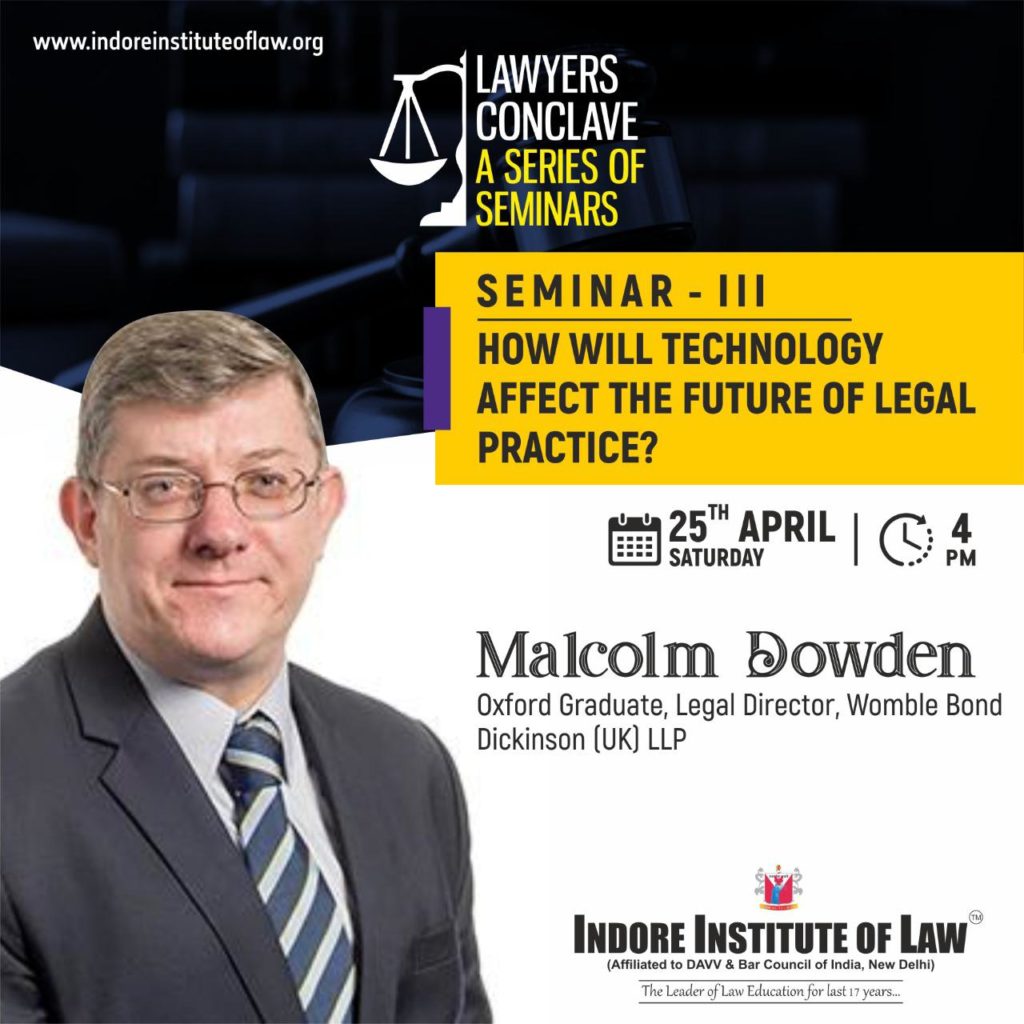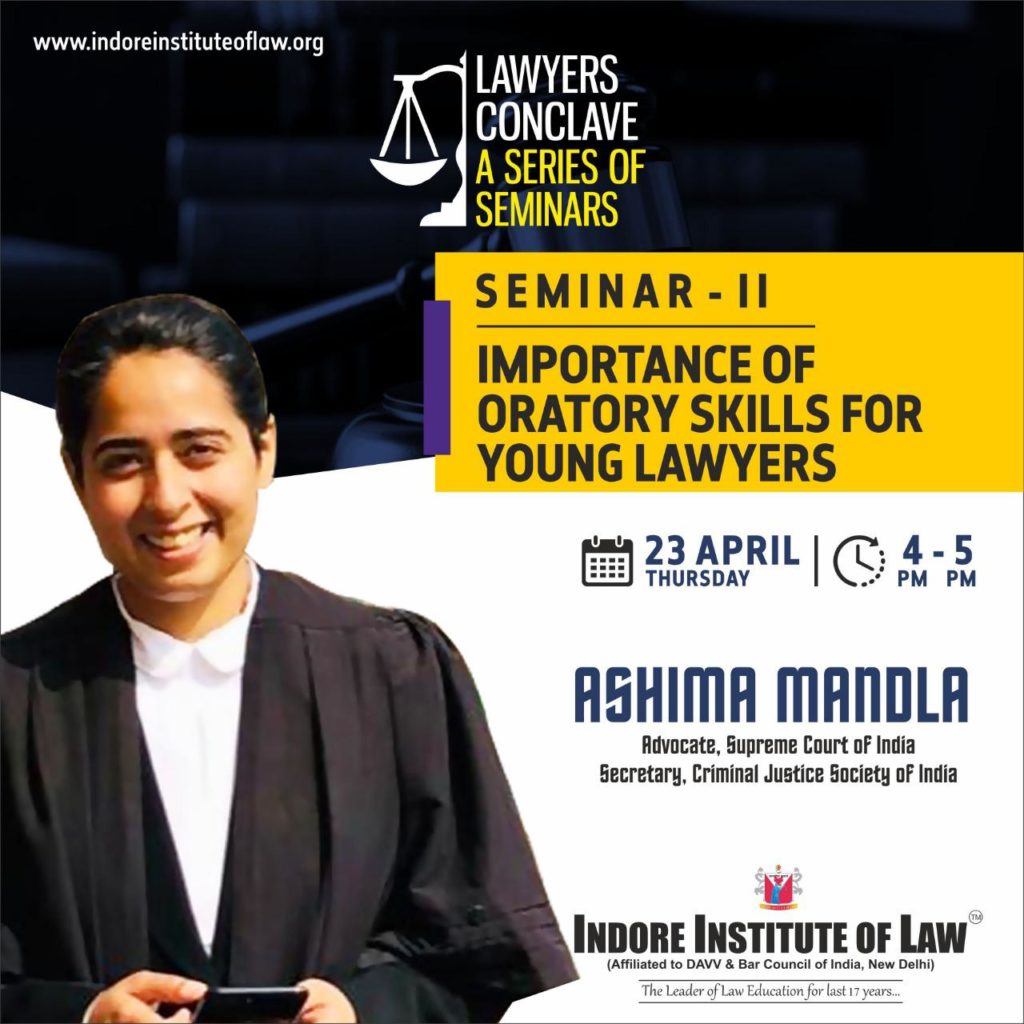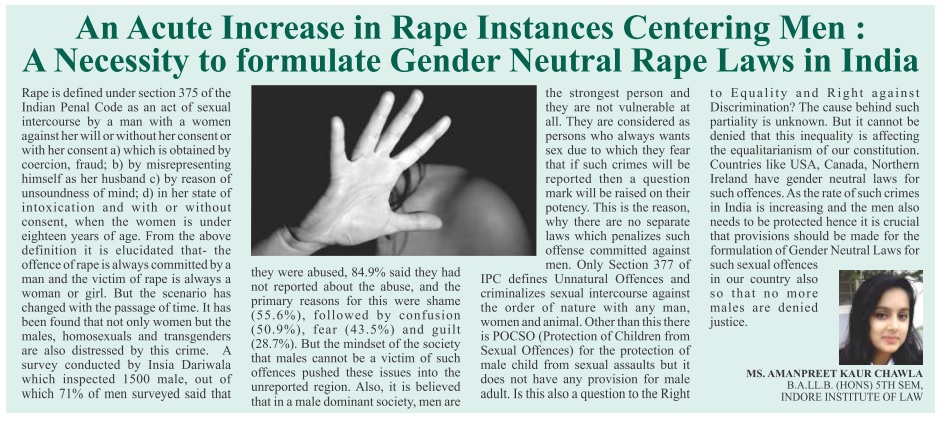The fifth series of webinar in Indore Institute of Law’s venture of series of webinars being conducted for law students and professionals was conducted on the very relevant and emerging topic of Law & Entrepreneurship.
Leadership defines how the team may move forward and in the present time, India’s leadership has made several efforts at emphasizing the importance and need of entrepreneurship, self reliance and domestic development.
In the view of the above, it becomes increasingly important to understand the opportunities and challenges ahead of Law graduates and professionals seeking to initiate entrepreneurial ventures. The 5th Webinar in the series comprised of the panel of Mr. Sandeep Bhalothia, Legal (Head) at Meliorism in UAE, Mr Sahil Puri, Business Development Manager at Flipkart and Mr. Nisshant Laroia, founder of Peacekeeping and Conflict Resolution Team. The discussion was witnessed by more than 1500 people.
The panel was carefully created to include the management and legal aspect of an enterprise that are requisite to be understood by anyone venturing in the same.
Nisshant Laroai, a graduate of Gujarat National Law University, Nisshant shared his own journey of becoming an entrepreneur from a Law Graduate and the prospect of combining both disciple. Based on his own personal experience, he shared a carefully sketched out roadmap for students wanting to start a venture of their own, advising the students to go for the old school effective method of having a constant written reminder of the goals set out by them and advised 4 check points for the same –
- Why – you must have a ‘written’ answer as to “why are you wanting to start the venture”
- Goal – the answer to “why” will help you ‘write’ and set the goal you want your ventures to achieve
- Resources – the goal will help you ‘write’ and demarcate the resources that your venture would need to achieve that goal.
- Technical Competence/ Team – Once you have the above “written down” on a piece of paper, you will understand the technical abilities that the venture requires. You then create a team that will be able to cover the technical requirements of your venture.
(As shared by the speaker, Mr. Nisshant Laroia)
Mr. Sahil Puri, a graduate of IIM Indore and working as the Business Development Manager at Flipkart shared his titillating views on the prospects of pursing a Masters in Business Administration pursuant to a Law Graduation. He also shared his deep understanding on Venture Capitalists and Angel Investors, on the need of developing a Business Plan and the many prospects to be kept in mind for aspiring entrepreneurs.
Mr. Sandeep Bhalothia, working as the Legal Counsel for Meliorism, a start up venture in Dubai, UAE shared the many prospects of legal hurdles that start ups can avoid and how legal acumen and knowledge plays its role in the same.
Mr. Sandeep focused on 5 important legal considerations for a start up to avoid legal hurdles:
- Business Structuring
- Importance of Effective Written Agreements
- Protecting IP
- Employment Law
- Use of Technology
The session gave the attendees a fairly laid out idea about the intricacies of venturing as an entrepreneur post a graduation in law, providing an opportunity to the students to evaluate possible prospects for themselves. It was a rather learning session and very practically stimulating for all those in attendance. It is our due pleasure to have association with knowledgeable experts such as the panelists for the session.

It was with such simple mannerism and specific methodology that the session was conducted.
Indore Institute of Law successfully conducted the IV Session in the Law Conclave series of Seminar on the Topic – Legal Research & Publication by one of the most renowned name in this field, Mr. Sumeet Malik, Director of EBC Publication & SCC Online.
The session witnessed an unprecedented turnout of 250 students in this online seminar.
Himself a graduate of National Law School India University, Bangalore (NLSIU), Mr. Malik initiated the session by asking the simplest of question to the students : “Why do you want to do Law” and proceeded with reminiscing the words of the most renowned name in legal academia Prof. N.R.Madhavan Menon that there are two things to be observed in order to succeed as a learner of law – (1) Where to find law (2) How to think like a lawyer.
In this session that was scheduled for 90 minutes but extended to 180 minutes on persuasion of those in attendance, Mr. Malik ignited that curiosity and ache for learning and excelling in the students that cannot be inculcated by mere classroom teachings.
Keeping the session entirely interactive and engaging students with various exercises and questions, the 180 minutes did not feel like a drag for even a second. In fact, even by the end, there were questions pouring in. Such is the command of Sir over legal research and core principles of law that the students poised a plethora of questions his way, all of which was patiently and effectively addressed by him.
Sir, swiftly went through the session explaining the importance of understanding relevant and irrelevant facts, question of law, question of facts, sources of law, stare decisis,, quadrants of knowledge, types of publications and most importantly the manner in which a case law and law journal must be accessed by a student or practitioner of law. He discussed many landmark judgments and the steep technicalities involved that are often missed by even the sharpest of minds.
The session was concluded with sir leaving the students with plenty of research ideas, several questions and curiosity to explore the area of legal research with a new found perspective. It is true that experience and expertise are unmatched by any other factor and today we surely witnessed the same with this session.
Sir concluded the session with saying that the students must spend considerable time and effort in reading landmark judgments and making it an exercise to understand the various implications and technicalities associated with the same. He motivated the students with the words that what sets the legal profession apart from any other is that all lawyers have the power to bring social change.
Truly, the session was an eye opener for all those in attendance that the outreach of law is far and beyond what eyes can see and my takeaway is something being said since time immemorial; law is a profession where one remains a student forever and only a teacher like Mr. Sumeet Malik can reignite that passion of learning even in the middle of a Global Pandemic.
We are grateful to your sir.

A graduate of Oxford University and having an experience of 26 years in legal profession, Mr. Dowden who is based in the United Kingdom shed light on the increasing dependence and development with regard to technology and the role played by it in the dispute resolution process all over the world.
The session was attended by a total of 180 students who were exposed to multitude of topics in relation to technological development and technology law. A detailed discussion on the impact of increasing e-commerce activities, the plausibility of entering legal binding agreements over technical portals and the possible lacunas to be addressed in this regard was undertaken.
On being asked on the feasibility of the Indian Contracts Act, 1857 in the present situation and its capability of sustaining in a technological world, Mr. Dowden opined that certainly there will be a need of review and revision in the existing provision. The students sought clarification on the impact of force majeure clause in the midst of Covid-19 and the extents of commercial litigation we may be witnessing post the lockdown.
The discussion moved further to the Sri Krishna Committee Report on Data Protection Law of India and the correlation of the same with the GDPR of UK.
The session was an elaborated discussion on some very contemporary topics like the merger between facebook and jio communications and the implication of the same on data privacy. The block chain technology regime and the increasing cyber crimes. The students and the speaker delved in discussion on a diverse range of topics and it was insight in a rapidly developing area of law which becomes more and more relevant with the passage of time.
On being asked if the technical and online legal information impacts the working for legal professional; Mr. Dowden replied with a smile “Do not confused your google search with my law degree” making it plenty clear that the technology can facilitate the legal profession but the mind of the lawyer will always be the rare resource.
We are thankful for his insight and valuable time for the session.

A student of psychology who chose to pursue law as a career and claims the same to work as an added advantage specially working in the area of Criminal Law, reminisced her initial days as an intern with Mr. K. T. S. Tulsi, Senior Advocate and Member of Parliament, when asked of her aspiration ahead she had replied “I want to be a criminal lawyer and a politician” adding that “I aspire to be like you”, we can certainly vouch that she certainly has taken the pathway for the same.
While in discussion with the students, Ms. Ashima thoughtfully suggested that choose a career that bring you success as well as happiness.
Speaking over the topic of the day, Ms. Ashima emphasized on the necessity of oratory skills for law students by saying that ‘Law is one profession where you constantly sell yourself, so you’ve to sound sure & convinced of yourself, you cannot afford to sound unsure’.
On being asked by a student whether the content is more important or it’s the flair of speaking that is more relevant, she responded by saying that Law isn’t theatrics, your knowledge is of utmost priority but the way you convey that knowledge is equally important.
Displaying the psychology student, Ms. Ashima talked about the reasons people are often not comfortable speaking in public, putting it to an early experience of being constantly judged for making mistakes and the fear of reprimand but insisted that it is not difficult to get over those fears once we are able to assure our minds.
The 160 students in attendance had a plethora of questions on this very relevant topic of discussion and were answered patiently and emphatically by the speaker of the day.
Anas, a student of Indore Institute, asked the skills that are essential for a law students to make their career a more promising one, to which Ms. Ashima responded by suggesting to read bare acts, learning the interpretation of those and not just simply remembering the provisions, reading through judgments and being able to understand the legal intricacies.
Students asked several questions based on her journey as a psychology student to a successful lawyer in the Supreme Court of India.
Anuj Gupta, final year student of Indore Institute of Law concluded by asking for suggestions for final year students graduating and joining courts, how can they capitalize their skills in oratory.
Ms. Ashima gave a practically viable response, suggesting the students to not focus on money in the first 6 month of career, to not be exploited by someone but making sure to invest time in learning the work and honing your skills even if you are paid less. She emphasized on the importance of skills and reiterated that grades do not ensure good career.
In its entirety, the students had an inspiring session and learned some very important aspects in relation to developing themselves and approaching their future career prospects.
We thank Advocate Ashima Mandla for her invaluable time and the knowledge she bestowed upon all those in attendance of the session. We hope to have her association in future as well.

